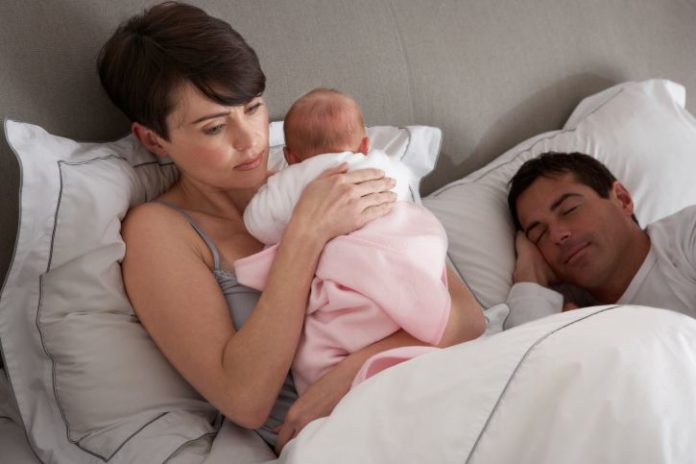The first few weeks after the delivery of a new baby are a time of considerable change for mothers.
Coping with all the responsibilities that come with a newborn and the changes in relationships that result can really take its toll.
Up to 85% of women suffer from some type of mood disturbance during the postpartum period.
For most women, the symptoms are short-lived and fairly mild. This is often referred to as the ‘baby blues’. However, for a small percentage of new mums the baby blues last a lot longer than a couple of weeks and can turn into something more serious, a condition known as postnatal (or postpartum) depression (PND).
Unfortunately this is a subject that still has a certain level of taboo surrounding it and people find it a hard topic to discuss but the last thing a new mother needs while she is facing depression is to be unnecessarily judged.
To try and debunk some of the myths and stigma attached to this condition we spoke to Renee, a new mum who has had first-hand experience with postnatal depression.
The power of hindsight
 Despite having a very happy pregnancy, Renee can now look back and see some difficulties she endured towards the end of her pregnancy may have contributed to her depression.
Despite having a very happy pregnancy, Renee can now look back and see some difficulties she endured towards the end of her pregnancy may have contributed to her depression.
“I felt mentally fine throughout most of my pregnancy. I didn’t notice and signs that may have indicated any future depression, for the most part I was as healthy as a horse,” Renee said.
“But during the last three weeks of my pregnancy I had issues with my health and as a result had to have an emergency C-section.
“The only preparation I had for my caesarean was when my mother told me that she suffered the same issue while she was pregnant and it might be hereditary,” she said.
“Unfortunately at the time I was also going through some family dramas that were causing me a bit of stress.
“I think this all added to my eventual depression.”
It wasn’t long after her son’s birth when Renee’s family noticed she wasn’t her normal self.
“I guess it started quite early,” Renee said.
“My friends and family definitely noticed a change in me but I didn’t see it personally.
“After a couple of months my mum spoke to me but I didn’t want to listen, then my mother in law tried to tell me but I took it as criticism of my mothering skills,” she said.
Throughout this stage, Renee said her depression was affecting almost every facet of her life.
“It seriously affected everything around me,” Renee said.
“I returned to work when my son was only four and a half months because I was so worried about being able to provide for him.
“I would have mini breakdowns at work over silly things like a little bit of stress or if my son was sick,” she said.
“It affected my relationship with my husband badly as well, we stopped communicating and stopped showing affection towards one another; everything was focused solely on our son.
“I was spiralling into a deep hole and I just wanted to bury myself in it.
“I tried to go on for a while longer before one day I completely snapped over something very trivial.
“I knew that feeling this way wasn’t right and I knew I needed to seek help,” she said.
Help is never far away
 Renee made an appointment with her GP to discuss what was going on.
Renee made an appointment with her GP to discuss what was going on.
“The doctor sent me off to have some blood tests done to make sure my iron levels and blood pressure were all ok,” she said.
“I returned to the GP a week later and we talked about visiting a therapist and the possibility of medication.
“I was unsure about medication at first but my mum assured me that there was no shame in taking medication, she told me the aim of the medication is to take the edge off and provide you with a clear train of thought.
“Even though my mum and I are completely different personalities I trust her guidance and decided that I would attend some sessions with a therapist and start taking the lowest dose of anti-depression medication available,” Renee said.
After taking on board the advice of her GP and her mother Renee says she could breathe a sigh of relief as she now had explanation as to why she had been feeling so bitter and upset.
“According to my loved ones this was definitely not my normal personality but now that I knew I could fix it I really aimed for a positive outcome,” she said.
The first step for Renee was to book some sessions with a therapist.
“My therapist and I discussed my situation over three sessions.
“In the beginning I was a little reluctant to talk about my personal issues with a stranger but the therapist helped me talk about issues that I felt I couldn’t discuss with my family,” she said.
“We talked about where my depression may have stemmed from and what to do moving forward which I found to be extremely useful.”
7 months on, Renee continues to take medication to help control the depression and said she will do so for some time.
“It is recommended that you continue to use the medication for at least six months and not to stop taking it suddenly without first seeing your doctor,” she said.
“The medication coupled with the therapy sessions was really successful in helping me on my road to recovery.”
I get by with a little help from my friends
 Now that Renee was starting to feel a lot better, she was really enjoying her role as a mother and wife again.
Now that Renee was starting to feel a lot better, she was really enjoying her role as a mother and wife again.
“I still returned to work full time but I just love coming home every night to give my son a big kiss and cuddle and see his cheeky smiles,” she said.
“My husband and baby have been nothing but supportive, they provide me with the love and kindness that I need to get through each day.
“There was one family member in particular who I thought was being a bit judgemental and offering advice I didn’t want but once I explained to everyone what I had been going on they were all so supportive and really appreciated my honesty in telling them.”
Even though Renee is feeling pretty good at the moment she does have some concerns over what the future may hold for her.
“I feel like I have currently beaten the blues for sure.
“But I definitely worry that they may return for baby number two, whenever that may be,” she said.
“The difference now is I feel more confident that between me, my family and my friends we now know some of the warning signs and how to provide a positive atmosphere to stop the anxiety returning.”
Trust me, I’ve been there
Renee has battled through the all the difficulties and challenges of postnatal depression and wishes to pass on some advice to families who may be facing a similar situation.
“For all families that are expecting a child, it is a good idea to know a little about what postnatal depression is.
“Like rain on a wintery day, depression can strike with little warning so the more prepared and the more you know about it, the better equipped you will be to deal with it,” Renee said.
 “And don’t forget that postnatal depression can affect fathers as well. The extra workload and stresses on a new father are often overlooked but dads aren’t immune to depression.
“And don’t forget that postnatal depression can affect fathers as well. The extra workload and stresses on a new father are often overlooked but dads aren’t immune to depression.
“Most importantly never be ashamed if you’re not feeling 100%.
“Take it as a sign that you may need to look at what is going on around you, use your instincts to identify changes that need to be made to help you to feel better and don’t hesitate to speak to your doctor about the way you feel.”
If family or friends suspect someone they are close to is suffering with post natal depression, they have to be sensitive in their approach as it may be quite a scary subject to bring up.
Renee said the best thing you could do based on her experience is to ask a very close friend of the new parent to sit down and have a chat with them.
“Get them to sit down with the person over a coffee to discuss life as a new mum or dad.
“Talk about all the ups and downs they are experiencing and give them strong moral support,” she said.
“A person with postnatal depression will not automatically recognise it in themselves.
“The last thing someone wants to hear is ‘I think you have a problem’ – but if they hear it from someone they trust and someone they know has their best interests at heart it will be a lot easier to accept.
Renee also said it is very important that the person feels like they have support around them.
“Simple things like babysitting or taking them out for coffee and a chat or helping with housework are priceless because it is the small things that really help and let someone know that they are not alone.”



 (12 votes, average: 4.08 out of 5)
(12 votes, average: 4.08 out of 5) 






